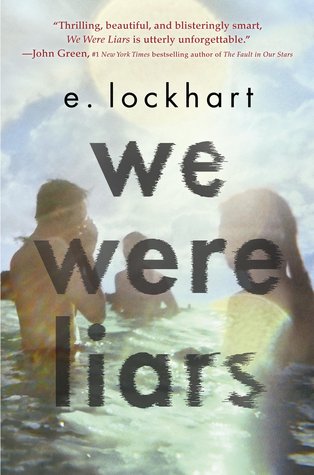 We Were Liars is a skillfully written coming of age story about long, hot, idyllic summers with kindred spirit cousins on the family's private island. It's also about how wealth and suspicion can tear families apart, how people change as they grow up and how complex a machine the human mind is. There's memory loss, the complexity and manifestation of grief and guilt and the strange effect it has on the perception of real life, and most importantly, the arrogant invincibility of youth.
We Were Liars is a skillfully written coming of age story about long, hot, idyllic summers with kindred spirit cousins on the family's private island. It's also about how wealth and suspicion can tear families apart, how people change as they grow up and how complex a machine the human mind is. There's memory loss, the complexity and manifestation of grief and guilt and the strange effect it has on the perception of real life, and most importantly, the arrogant invincibility of youth.15-year old Cadence Sinclair introduces the reader to her rugged, blonde, athletic, wealthy and emotionally repressed viper pit of a family in the first paragraph; “Sinclairs are athletic; tall and handsome. We are old money democrats. Our smiles are wide, our chins square, our tennis serves aggressive”. She has a wonderfully appealing turn of phrase- she’s charming, self-deprecating and dismissive of her obvious privilege. Cadence narrates the novel, and she’s a really likeable narrator, but she doesn’t really know the whole story. She’s a broken and fragmented speaker, one trying to assemble the pieces of the picture from fragments of memory and inference. She doesn’t expand greatly on the family members or the presumably lush locations, there’s no elegance or style to her narrative. She’s telling it for her own piece of mind, talking herself through what she recalls in the hope of cracking open the memory that she's convinced is still buried deep down somewhere.
The author does an amazing job of isolating the convalescing narrator- recovering from some mysterious injury and suffering headaches, she's desperate to return to the island after a few absent years to see her cousins; the only people that she feels really get her. Despite their long separations (without correspondence) during autumn, winter and spring, the cousins remain as close and as ever and pick up where they left off each summer. Cadence, Johnny and Mirren, her cousins and Gat a child-of-a-family-friend who nobody's sure if he gets to be there or not make up the four ‘liars’. At the age of 15, Cadence falls for Gat, but at the end of that summer, she has some sort of accident or meltdown, but can’t remember the reasons or the circumstances. Her only recollection is being found in her underwear on the shore, the surf crashing around her.
The novel casts a flinty eye on the lives of the American elite. It turns out it’s not all regattas, Ivy League schools and summerhouses in Martha’s Vineyard- wealth brings its own set of problems that gnaw away at families from the inside. The Sinclairs, like the most ordinary families, are tormented by deaths, addiction and tragedy. Their privilege does not buy them immunity from tragedy, but it does allow them to hide their raw emotions behind their smiling faces. Pain, like money, is simply not spoken about.
The book has an excellent hazy, dreamlike quality to it that's really effective in giving the impression that something is wrong, although it’s impossible throughout most of the narrative to properly identify what it is that doesn’t add up. The reader just can’t pin it down. It's so full of mystery and secrets, Cadence rakes through the family's behaviour, lies and omissions searching for clues and answers and the build up to her discovery is genuinely thrilling. I loved the gradually increasing sense of unease and sickly suspense throughout this novel, but unfortunately the ending sort of popped the balloon that had been slowly inflating (for me, at least).

No comments:
Post a Comment